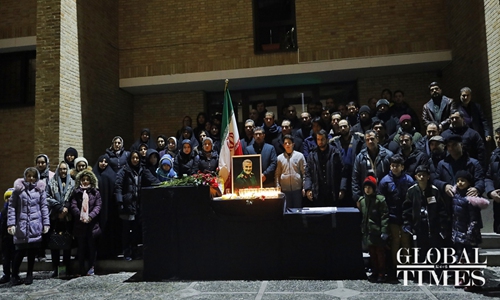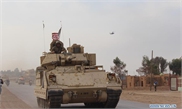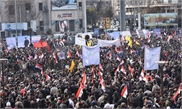
Iranians in Beijing gathered on Tuesday night to pay tribute to Qasem Soleimani and his martyred companions. They sent sympathy flowers and lighted memorial candles in front of the Islamic Republic of Iran Embassy in Beijing. Photos: GT/Li Hao
In the early hours of Wednesday local time, Iran launched two rounds of missile attacks at military bases in Iraq housing US troops. According to Tehran, the attacks were in retaliation for the US killing of Iranian commander Qassem Suleimani. US President Donald Trump said he will deliver a speech Wednesday night Beijing time on the current situation.
Either before or after Iran launched missiles at US bases in Iraq, it is the US that will determine whether the Middle East enjoys peace or faces war. Iran's national strength does not match that of the US. How the US will react - whether to push the tensions toward an all-out conflict or leave some room for concessions - is key to the situation.
It is understandable that both the US and Iran are facing tremendous pressures. But keeping the situation from being carried along by their pressures is exactly the embodiment of courage and wisdom.
Up until now, the US has not yet confirmed that Iran's attacks had caused US troop casualties. If there were indeed no injuries or deaths, it is hoped that the US can pay more attention to this circumstance and make it a new start for the future situation.
Historical experience has shown that waging wars were often not the belligerents' actual will. Many wars were pushed step by step by particular ways of interaction between different governments as well as between governments and their peoples. Currently, there is no sign that either the US or Iran is willing to engage in a large-scale war. But the risk of war is real. This is a typical case.
It is highly possible to avoid a large-scale war between the US and Iran. This is in line with the two countries' interests and the spirit of the current times. There are several communication tools in the modern world. The desire for peace cannot be completely overwhelmed by the impulse for revenge, and making compromises has become quite a common practice. The rapid transition from fierce confrontation to compromise is far more realistic in the 21st century than during WWI more than a century ago.
All major world powers expect peace in the Middle East. One of the reasons is that peace in the region is welcomed by globalization, and it will bring benefits to various parties deeply involved in globalization. All parties that call for restraint by the US and Iran are quite sincere. This is a remarkable progress of human society.
Politically, it is the simplest option for the US and Iran to get trapped in retaliation. Concessions are much harder - this is exactly the reason why it can reflect courage and wisdom.
There is no need to prove that the US is powerful. The US can hardly cope with the extremely complicated Middle East situation by taking vengeance on Iran. The US has a better option - to help maintain regional peace, which will benefit itself as well.
This round of US-Iran conflicts came suddenly, and the world has been caught unawares. The situation needs to be slowed down, which can create room for all kinds of positive options. The Iran nuclear issue had already made a soft landing, and the Gulf situation had seen an upturn. It is hoped that all parties can try hard to retrieve such situations.



